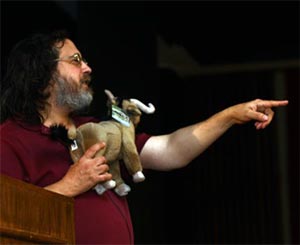 |
| Richard Stallman auctions off a stuffed gnu, the mascot of his federation, in the McInnes Room, Dal SUB, earlier this week. (Bruce Bottomley Photo) |
It isn't often that helping your neighbour is equated with losing your own freedom, but that was the analogy drawn by Richard Stallman, president of the Free Software Foundation. During his lecture on the free software movement and GNU/Linux, the computer software pioneer spoke of how our society teaches people to adopt software programs based on “superficial, practical advantages.”
To the nearly 300 who packed the McInnes Room on Tuesday, Jan. 27, he urged people ask themselves questions about their software choices.
“Is it powerful? Is it convenient? Is it reliable? What does it cost?” he asked, and then added, “If I use this program what will it do to my freedom? If I use this program, what will it do to the social solidarity of my community? What kind of way of life does this software impose on its users?”
He called on those interested to “reject the propaganda terms that developers of proprietary software use to demonize the act of helping your neighbour.” By labelling people who share as “pirates,” the developers are “trying to sneak past us the assumption that helping your neighbour is the moral equivalent of attacking a ship.” As the laughter continued, Mr. Stallman presented further ideas the free software movement is concerned with.
“Great software means software that respects the user's freedom. So it is free in the sense of freedom, not as in price.” He then added, “a free program is one that respects the user's freedom and social solidarity of the user's community.”Â
But Mr. Stallman’s definition of freedom is different than that of a politician. The “four essential freedoms” include the ability to study and change source code while running programs as one wishes and the choice to make copies of modified versions and distribute them, “helping your neighbour,” he said.
While it is common to associate the letters “D.R.M.” with digital rights management, Mr. Stallman spoke of “digital restriction management.”
“We've got to be careful about the implications of the terminology that we might pick up unthinkingly of other people that have thought very carefully of the implications of it,” he said. “The purpose is to restrict the public's access to technology. It is a conspiracy of companies acting together.”
“You should not give up your freedom to these malicious products. You should never buy, rent or accept as a gift any product designed with digital restriction management unless you personally possess the means to break the handcuffs and do the things that the conspiracy does not want you to do.”
As the lecture continued, it was apparent that software development, and education are all affected by corporations as well as governmental policies. “We should also reject the propaganda terms that developers of proprietary software use to demonize the act of helping your neighbour,” he emphasized.
